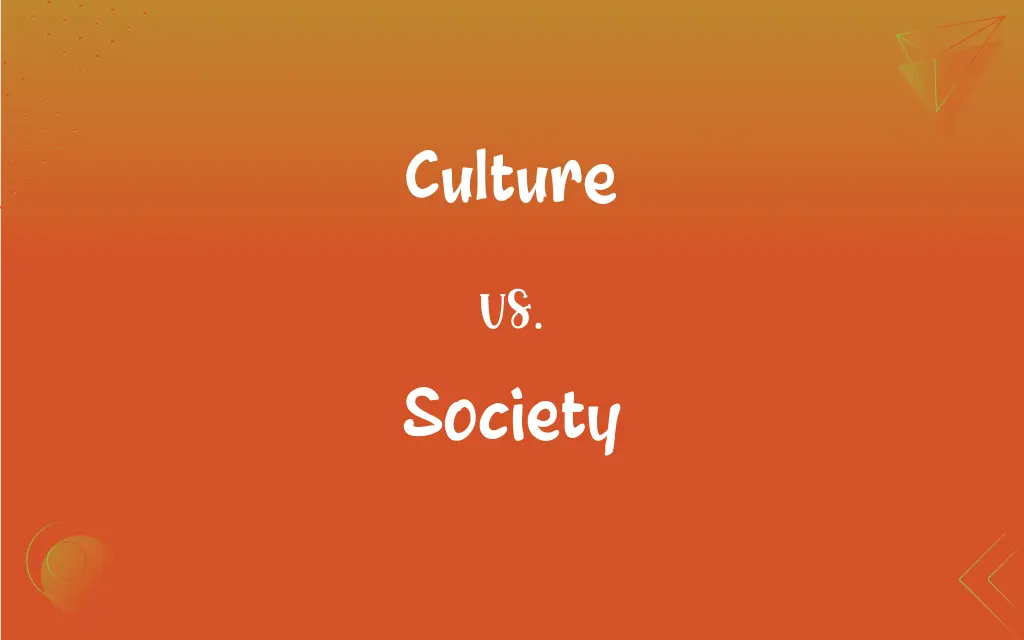Culture vs. Society: What's the Difference?
Edited by Janet White || By Harlon Moss || Updated on October 18, 2023
Culture refers to shared beliefs, customs, and behaviors, while society is a group of people living together with shared norms and values.

Key Differences
Culture encompasses the shared beliefs, values, norms, customs, and behaviors of a group or community. In contrast, society denotes a group of individuals who live in a defined geographical area, sharing common laws, relationships, and institutions.
Culture is the collective mindset and way of life, shaped by factors like history, religion, and language. Society, however, refers to the intricate network of relationships and structures that individuals form to live cohesively, which could span families, organizations, or entire nations.
The tangible elements of culture, like art, music, and clothing, reflect the deeper beliefs and values of a society. Conversely, the structural elements of society, such as political and economic systems, often influence the shaping of a culture over time.
Culture can exist without a society; for instance, ancient cultures that have disappeared but whose practices and artifacts we study today. On the other hand, society cannot function without culture, as culture gives society its identity and direction.
Comparison Chart
Definition
Shared beliefs, values, customs, behaviors
Group of people with shared norms/values
ADVERTISEMENT
Relies on
History, religion, language
Interpersonal relationships, institutions
Tangibility
Art, music, clothing
Political systems, organizations
Can it exist independently?
Yes (e.g., ancient cultures without current societies)
No (relies on culture for identity)
Primary Focus
Ways of thinking, feeling, and acting
Structure and organization
Culture and Society Definitions
Culture
The shared beliefs and values of a community.
The local culture emphasizes family and tradition.
ADVERTISEMENT
Society
The aggregate of people in a community living together in more or less ordered communities.
Modern society faces challenges with the rise of technology.
Culture
The arts and other human achievements regarded collectively.
The city is known for its vibrant music culture.
Society
A community of people living in a particular region and having shared customs.
The society of the small town was tight-knit and supportive.
Culture
A set of shared attitudes or values.
The youth culture today is very tech-oriented.
Society
A group of people with a common cultural, economic, or political interest.
The literary society meets monthly to discuss classic books.
Culture
The ideas, customs, and behaviors of a particular group.
The company's culture promotes teamwork and innovation.
Society
An organized group of persons associated for some specific purpose.
She joined a society for the preservation of historic buildings.
Culture
A way of life for a group of people, including customs, practices, and values.
Immigrants often bring the richness of their culture to their new countries.
Society
The system of relationships between individuals and groups.
Society's views on certain issues have evolved over time.
Culture
The arts, beliefs, customs, institutions, and other products of human work and thought considered as a unit, especially with regard to a particular time or social group
Edwardian culture.
Japanese culture.
Society
The totality of people regarded as forming a community of interdependent individuals
Working for the benefit of society.
Culture
These arts, beliefs, and other products considered with respect to a particular subject or mode of expression
Musical culture.
Oral culture.
Society
A group of people broadly distinguished from other groups by mutual interests, participation in characteristic relationships, shared institutions, and a common culture
Rural society.
Literary society.
FAQs
How does culture influence society?
Culture shapes the beliefs, behaviors, and values that bind members of a society together.
Can a society exist without culture?
No, culture provides the identity and foundation for any society.
What is culture?
Culture encompasses the shared beliefs, values, customs, and behaviors of a group.
What defines a society?
Society refers to a group of individuals living together with shared norms, values, and structures.
What's a subculture within a society?
A subculture is a cultural group within a larger culture with its own distinct beliefs and practices.
Can culture be passed down through generations?
Yes, culture is often transmitted through storytelling, rituals, and shared practices.
Why is culture important to society?
Culture provides a framework for understanding the world and guiding behavior within society.
How does language contribute to culture?
Language is a key component of culture, enabling communication, preserving history, and expressing beliefs.
Is there a difference between western society and western culture?
Yes, western society refers to the people and structures, while western culture refers to the beliefs, customs, and arts.
What role does technology play in shaping culture and society?
Technology influences how people interact, share information, and develop cultural norms within society.
Can culture change over time within a society?
Yes, culture can evolve based on factors like technology, migration, or global influences.
How do individuals contribute to society?
Individuals contribute by participating in its structures, following its norms, and influencing its direction.
Can there be multiple cultures within one society?
Yes, many societies are multicultural with various cultural groups coexisting.
How do rituals and traditions fit into culture and society?
Rituals and traditions are expressions of culture and help reinforce the values and cohesion of a society.
Can a culture survive outside its original society?
Yes, cultures can and do survive through diasporas and when adopted or integrated into other societies.
Do societies influence the cultures within them?
Yes, societal structures and events can shape and influence cultural practices and beliefs.
Can a person belong to multiple societies and cultures?
Yes, especially in our globalized world, individuals often identify with multiple societies and cultures.
Why do societies have laws?
Laws provide structure, protect members, and ensure the orderly functioning of society.
How do education and culture relate in a society?
Education helps transmit and shape the culture of a society, ensuring its preservation and evolution.
How do societal norms differ from cultural norms?
Societal norms dictate expected behaviors within a society, while cultural norms are broader, encompassing beliefs, values, and customs.
About Author
Written by
Harlon MossHarlon is a seasoned quality moderator and accomplished content writer for Difference Wiki. An alumnus of the prestigious University of California, he earned his degree in Computer Science. Leveraging his academic background, Harlon brings a meticulous and informed perspective to his work, ensuring content accuracy and excellence.
Edited by
Janet WhiteJanet White has been an esteemed writer and blogger for Difference Wiki. Holding a Master's degree in Science and Medical Journalism from the prestigious Boston University, she has consistently demonstrated her expertise and passion for her field. When she's not immersed in her work, Janet relishes her time exercising, delving into a good book, and cherishing moments with friends and family.































































